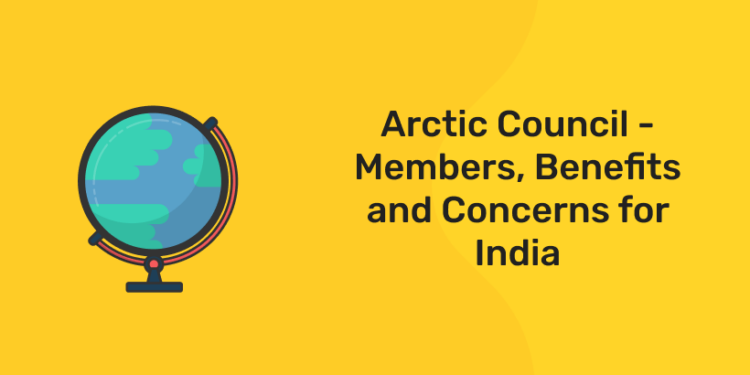Table of Contents
At the contemporary, eight countries exercise sovereignty over the lands within the Arctic Circle, and these form the member states of the council: Canada; Denmark; Finland; Iceland; Norway; Russia; Sweden; and the United States. The Arctic Council is a high-level intergovernmental forum that tends tackles issues faced by the Arctic governments and the indigenous people of the Arctic. Other countries or national groups can be enrolled as observer states, while organizations representing the concerns of indigenous peoples can be admitted as indigenous permanent participants. India was re-elected as an observer to the Arctic Council in its recent summit at Rovaniemi, Finland.
Arctic Council – Insights
The Arctic Council is a high-level intergovernmental forum that tends tackles issues faced by the Arctic governments and the indigenous people of the Arctic. At the contemporary, eight countries exercise sovereignty over the lands within the Arctic Circle, and these form the member states of the council: Canada; Denmark; Finland; Iceland; Norway; Russia; Sweden; and the United States.
Other countries or national groups can be enrolled as observer states, while organizations representing the concerns of indigenous peoples can be admitted as indigenous permanent participants. India was re-elected as an observer to the Arctic Council in its recent summit at Rovaniemi, Finland.
- Ottawa declaration took place in 1996
- It is an Intergovernmental forum which tackles problems faced by the Arctic governments and people living in the Arctic region
- It is Not a treaty-based international organization but it is an international forum that functions on the basis of consensus.
- The decisions, recommendations or guidelines of the Arctic Council are non-enforceable and strictly the prerogative of the individual state.
- Its mandate explicitly excludes military security.
- Organization structure is has follows
- Chairmanship: rotated every two years once
- Secretariat:
- Shift of position biennially with the Chairmanship of the Arctic Council
- It aids the Chair of the Arctic Council
- It manages logistics related to the biennial member states’ meetings and the more frequent SAO meetings
- SAO ( Senior Arctic Official) is a government representative, usually from a member states’ Ministry of Foreign Affairs
- SAO guides and administers Arctic Council activities in accordance with the decisions and instructions of the Arctic Council Foreign Ministers.
Arctic Council – Members
The Arctic Council is a high-level intergovernmental forum that tends tackles issues faced by the Arctic governments and the indigenous people of the Arctic. At the contemporary, eight countries exercise sovereignty over the lands within the Arctic Circle, and these form the member states of the council: Canada; Denmark; Finland; Iceland; Norway; Russia; Sweden; and the United States.
Other countries or national groups can be enrolled as observer states, while organizations representing the concerns of indigenous peoples can be admitted as indigenous permanent participants. India was re-elected as an observer to the Arctic Council in its recent summit at Rovaniemi, Finland.
CAFF is the biodiversity working group of the Arctic Council and is made of National Representatives designated by each of the Eight Arctic Council Member States, representatives of Indigenous Peoples’ organizations that are Permanent Participants to the Council, and Arctic Council observer countries and organizations.
The Arctic Council Member States are:
- Canada
- Denmark
- Finland
- Iceland
- Norway
- Russia
- Sweden
- the United States.
Arctic Council – Benefits
The Arctic Council is a high-level intergovernmental forum that tends tackles issues faced by the Arctic governments and the indigenous people of the Arctic. At the contemporary, eight countries exercise sovereignty over the lands within the Arctic Circle, and these form the member states of the council: Canada; Denmark; Finland; Iceland; Norway; Russia; Sweden; and the United States.
Other countries or national groups can be enrolled as observer states, while organizations representing the concerns of indigenous peoples can be admitted as indigenous permanent participants. India was re-elected as an observer to the Arctic Council in its recent summit at Rovaniemi, Finland.
Listed below are few of the benefits of the artic council and its impact
- The Arctic is a important region that helps preserve the balance of the global climate.
- The Arctic environment is particularly sensitive to short-lived climate pollutants, including black carbon, due to their strong warming effect
- With ambitious policy action to decrease air pollutants, Arctic Council countries would obtain a positive effect on health and the environment throughout their territory, while also helping to slow down climate change by reducing emissions of black carbon
- The report calls for ambitious policy action to reduce air pollution in Arctic Council countries, highlighting the environmental, health, and economic benefits from policy action.
- The Arctic Council is the intergovernmental forum assisting cooperation, coordination and interaction among the Arctic States, Arctic Indigenous peoples and other Arctic inhabitants on common Arctic issues, in particular on issues of sustainable development and environmental protection in the Arctic.
Arctic Council – Concerns for India
The Arctic Council is a high-level intergovernmental forum that tends tackles issues faced by the Arctic governments and the indigenous people of the Arctic. At the contemporary, eight countries exercise sovereignty over the lands within the Arctic Circle, and these form the member states of the council: Canada; Denmark; Finland; Iceland; Norway; Russia; Sweden; and the United States.
Other countries or national groups can be enrolled as observer states, while organizations representing the concerns of indigenous peoples can be admitted as indigenous permanent participants. India was re-elected as an observer to the Arctic Council in its recent summit at Rovaniemi, Finland
- India’s Arctic Policy (IAP) was identified as a draft document in early January 2021, and the draft policy is in line with India’s fast expanding scientific-technological (‘SciTech’ power) status which has both national and international dimensions
- As per the global ranking, India contemporary, occupies the third position in scientific and technical manpower in the world
- Its Research and Development (R&D) expenditure and Science and Technology(S&T) publications also developed significantly. With the surge in S&T publications, India is globally at the third position.
- IAP has been drafted in a strategic milieu of big powers (like China) having invested with huge ambition in the Arctic region. China’s ‘Polar Silk Road’
- Most importantly a part of its robust ‘Belt and Road Initiative’ (BRI) which seeks to reinforce its geopolitical and geoeconomic posture in the region.
- India has stepped in at the right time with its ‘sustainable engagement’ diplomacy and ‘SciTech’ power in the Arctic.
- Geospatially, the Arctic is situated above the Arctic Circle, which encompasses the Arctic Ocean basin (roughly 6.1 million square miles) and the northern parts of Scandinavia, Russia, Canada, Denmark (Greenland), and the U.S. state of Alaska. Canada, Russia, Denmark, Norway and the U.S. state of Alaska have direct access to as well as jurisdiction over the Arctic Ocean.
- The Arctic Council was made as an intergovernmental forum with these countries along with Finland, Sweden and Iceland, following the Ottawa Declaration in 1996. The Declaration has provisions [3(a), (b) and (c)] for non-Arctic states and organisations to participate in and contribute to the working of the Council with an ‘Observer status.’
- The Council is envisaged as a platform promote cooperation, coordination and interaction among the Arctic states, Arctic Indigenous peoples and other Arctic actors on common issues such as environmental protection and sustainable development in the region.
Download Entri and practice free mock tests and ace your competitive exams
I hope this article was helpful. The key point to clear an exam lies in methodical and planned preparation. If you are a candidate who wants to pursue your dream career and looking for a good start, our Entri app has got it covered for you. Our team will help you with content and insights related to the topics of your concern. Subscribe to our app today and enrol yourself into various programmes our app offers. Tune in to the app to stay updated regarding various aspects of the subject you are interested in. Feel free to post any queries and doubts in the comment section. We will try our best to reach out. Push away all those self-doubts and negative thoughts. Try to have a clear vision. Ask yourself why you want this. Focus on the good and work hard. There is a saying that goes like this, Get up and set your shoulders to the wheel-how long is life for you? as you have come to this world leave some mark behind or where is the difference between your trees and stones they too come into existence decay and die. Each day is a precious gift bestowed upon us so make it count. Work on yourself. Stop procrastinating. Today is the day, hope for the best. Good luck.












